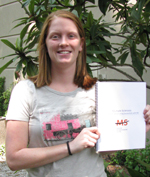|
By Dawn Brazell
Public Relations
If Hannah Foster could
win the lottery, she'd start a clinic for the uninsured so that anyone
who needed physical therapy could get the critical treatment they
needed regardless of finances.
"I'd want to open a Hotel Rwanda and take in people who needed help,"
she said, tucking her strawberry blonde hair behind her ear in a
decisive move. The College of Health Professions graduate landed a
competitive position at Brooks Rehabilitation Hospital in Jacksonville,
Fla., where she will start a neurologic physical therapy residency
after graduation.
Her toughest challenge isn't the heartbreaking cases she sees of her
patients with brain and spinal cord injuries. It's seeing the ones who
lack the funds to continue their treatment. Though she knows she can't
help them all, many of them she knows she can.
"I just love helping
people. I volunteer a lot because I just really love to help people.
The thing I love about physical therapy is that you spend so much time
with your patients, and you help them restore some function that
they've lost and give them back a quality of life."
 Hannah
Foster Hannah
Foster
Her mentor, Sara V. Kraft,
DPT, said Foster's main strength is her compassion that comes through
in her work. "She truly empathizes with her patients and goes above and
beyond for them on a regular basis. I think a compassionate clinician
makes the best clinician."
Praising Foster for how
she consistently volunteered for various community projects, Kraft
found Foster gives back to her profession in the same manner.
"Hannah adds enthusiasm,
caring and a thirst for knowledge that will help her grow as a
therapist."
That already is evident.
On her rotation in an
acute care facility in Myrtle Beach, Foster met a woman who was
overwhelmed in dealing with her diagnosis of multiple sclerosis. She
was bawling one day as she talked to Foster, who didn't just want to
refer the tired patient to online resources that might add to her
frustration.
Foster decided instead to
go to the best online sources and distill the critical information that
would most help her.
During the next three
weeks in addition to her class work, she compiled an 88-page booklet
that now the National Multiple Sclerosis (MS) Society is looking at
publishing.
Kraft said the booklet is
a prime example how Foster goes above and beyond for her patients and
that it will be a resource that will go beyond helping that one patient
with multiple sclerosis.
Foster is thrilled the
booklet might be used on a wider scale. She said she worries about her
patients
and doesn't like sending them home to do research on their own. Patient
education is so important in a person's ability to get better results
in therapy. It's one of the reasons she wrote the MS booklet, said the
St. Louis native.
MUSC was one of the few schools Foster applied to outside of the
Midwest. When she toured the campus, she just knew this was the right
place, she said.
The people were friendly
and faculty seemed passionate about the field. She chose physical
therapy because she was interested in the medical field and likes how
therapists spend quality time with their patients. She fell in love
with the neurological part of her field during that part of her
coursework.
Though working on a brain
injury unit can be discouraging and really sad at times, there also are
moments of touching victories, she said. She's learned to focus her
energy on the positive small signs of improvement. "When you start
seeing progress, it's more motivating than discouraging."
She's excited to graduate
and be able to apply what she's learned in the field. She's grateful to
a faculty that has been generous with time and passion, including
Kraft. "When you're learning from someone who is so passionate about
it, it makes it so much easier."
She also credits her
parents with her success so far. "It was a great home to grow up in.
I've always felt supported—no matter what."
It's a feeling she wants
to pass on to her patients, she said.
"That's what drew me to
the neuro side of physical therapy. I love that at the end of the day
if you've had a successful day with a patient that you can be giving
them something back—like taking steps again or being able to move their
arm again. It's all these different things that are so life-changing
for them that you can give back to them.
"I just love that part of
neuro—when you have a good day—you really have a good day."
|



 Hannah
Foster
Hannah
Foster